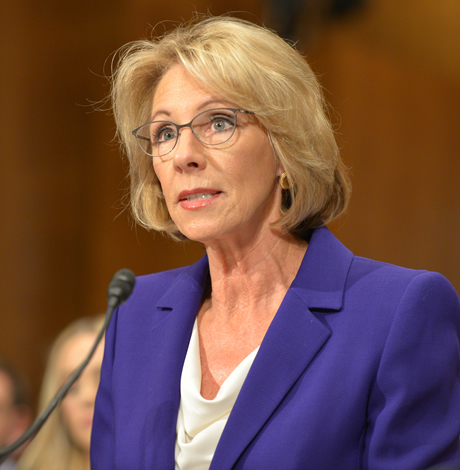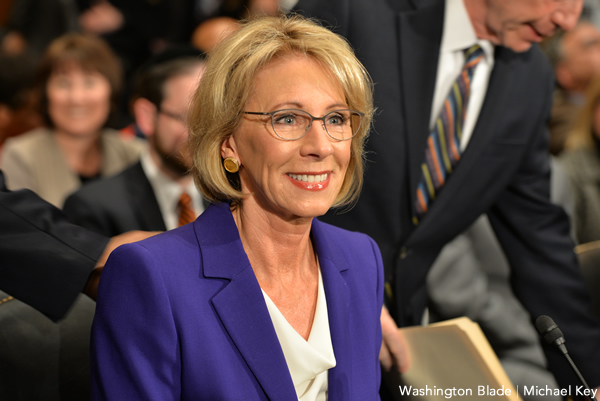News
DeVos: It’s OK if states discriminate against LGBT students
Education sec’y also won’t denounce racial discrimination


Betsy DeVos refused to denounce discrimination against LGBT students.
(Blade file photo by Michael Key)
Under a grilling during a congressional hearing Wednesday, Education Secretary Betsy DeVos refused to say she’ll speak out against discrimination against LGBT students — or even students experiencing racial discrimination.
Rep. Katherine Clark (D-Mass.) pressed DeVos during a House Appropriations subcommittee hearing on Lighthouse Christian Academy, a private school in Indiana the lawmaker says is the recipient school voucher money, but may not admit students from families with “homosexual or bisexual activity” or “practicing alternate identity.”
Clark asked DeVos, who’s advocating a budget that calls for a $250 million increase in school voucher funds, if she’ll “stand up that this school will be open to all students.”
DeVos first dodged the question, saying she’ll like to defer to earlier comment from lawmaker, and still refused to denounce the policy when asked to draw a line on state flexibility and reject money for schools discriminating on the basis of sexual orientation, race or special needs.
“For states who have programs that allow for parents to make choices, they set up the rules around that,” DeVos said.
Pressed further by Clark on whether the Education Department would withhold school vouchers on any situation regarding discrimination, DeVos again refused to answer.
“The Office of Civil Rights and our Title IX protections are broadly applicable across the board,” DeVos said. “But when it comes to parents making choices on behalf of their students…”
Davis interrupting by saying “this isn’t about parents making choices, this is about use of federal dollars,” and pressed DeVos who provided a non-answer about flexibility.
“So, if I understand your testimony,” Davis responded, “I want to make sure I get this right. There’s no situation of discrimination or exclusion that if a state approved it for its voucher program, that you would step and say that’s now how we’re going to use our federal dollars? There’s no situation, if the state approved it, that you would put the state flexibility over our students? Is that your testimony?”
DeVos began to say the situation was “hypothetical,” but Davis responded the situation was real and pointed to Lighthouse Christian Academy. At this point, the Republican chair of the committee informed Davis her time had expired.
“The bottom line is we believe that parents are the best equipped to make choices for their children’s schooling and education decisions, and too many children today are trapped in schools that don’t work for them,” DeVos said. “We have to do something different, we have to do something different than continuing a top-down, one-size-fits-all approach, and that is the focus, and states and local communities are best equipped to make these decisions and framework on behalf of their students.”
Davis, seemingly exasperated, concluded, “I am shocked that you could not come up with one example of discrimination that you would stand up for students.”
David Stacy, government affairs director for the Human Rights Campaign, was among those denouncing DeVos for refusing to denounce anti-LGBT discrimination.
“Taxpayer funds should never be used to discriminate against LGBTQ students, and it is shocking and disappointing that Secretary DeVos won’t make this basic commitment,” Stacy said. “Secretary DeVos has failed again to stand up for all students and ensure every child is able to receive an education free from harassment and discrimination.”
Federal law against discrimination in schools also prohibits charter and private schools from discriminating against students. Title VI of the Civil Rights Act of 1964 prohibits discrimination on the basis of race, color, and national origin for any school accepting federal funds, and Title IX of the Education Amendments of 1972 prohibits discrimination on the basis of sex for any school accepting federal funds. There is an exemption in Title IX for religious schools, but not for charter or secular private schools.
DeVos, who was narrowly confirmed by the Senate, has been a controversial figure and despised by charter school opponents for her support for school vouchers.
Earlier this year, DeVos and U.S. Attorney General Jeff Sessions revoked Obama-era guidance barring schools from discriminating against transgender students or denying them access to the restroom consistent with their gender identity.
Media reports indicated she resisted the change, but she ultimately agreed to it. Afterwards, DeVos met with transgender students and a trio of LGBT advocacy groups at the Education Department.
Sarah Kate Ellis, CEO of GLAAD, also denounced DeVos and said the education secretary was “turning a blind eye to LGBTQ students who experience discrimination in school.”
“DeVos once claimed she was an LGBTQ ally, but has now supported back to back policies that would erase LGBTQ students from classrooms,” Ellis said. “If she wants to be known as more than an anti-LGBTQ activist the time is now to reverse course.”
h/t Huffington Post
Kansas
ACLU sues Kansas over law invalidating trans residents’ IDs
A new Kansas bill requires transgender residents to have their driver’s licenses reflect their sex assigned at birth, invalidating current licenses.

Transgender people across Kansas received letters in the mail on Wednesday demanding the immediate surrender of their driver’s licenses following passage of one of the harshest transgender bathroom bans in the nation. Now the American Civil Liberties Union is filing a lawsuit to block the ban and protect transgender residents from what advocates describe as “sweeping” and “punitive” consequences.
Independent journalist Erin Reed broke the story Wednesday after lawmakers approved House Substitute for Senate Bill 244. In her reporting, Reed included a photo of the letter sent to transgender Kansans, requiring them to obtain a driver’s license that reflects their sex assigned at birth rather than the gender with which they identify.
According to the reporting, transgender Kansans must surrender their driver’s licenses and that their current credentials — regardless of expiration date — will be considered invalid upon the law’s publication. The move effectively nullifies previously issued identification documents, creating immediate uncertainty for those impacted.
House Substitute for Senate Bill 244 also stipulates that any transgender person caught driving without a valid license could face a class B misdemeanor, punishable by up to six months in jail and a $1,000 fine. That potential penalty adds a criminal dimension to what began as an administrative action. It also compounds the legal risks for transgender Kansans, as the state already requires county jails to house inmates according to sex assigned at birth — a policy that advocates say can place transgender detainees at heightened risk.
Beyond identification issues, SB 244 not only bans transgender people from using restrooms that match their gender identity in government buildings — including libraries, courthouses, state parks, hospitals, and interstate rest stops — with the possibility for criminal penalties, but also allows for what critics have described as a “bathroom bounty hunter” provision. The measure permits anyone who encounters a transgender person in a restroom — including potentially in private businesses — to sue them for large sums of money, dramatically expanding the scope of enforcement beyond government authorities.
The lawsuit challenging SB 244 was filed today in the District Court of Douglas County on behalf of anonymous plaintiffs Daniel Doe and Matthew Moe by the American Civil Liberties Union, the ACLU of Kansas, and Ballard Spahr LLP. The complaint argues that SB 244 violates the Kansas Constitution’s protections for personal autonomy, privacy, equality under the law, due process, and freedom of speech.
Additionally, the American Civil Liberties Union filed a temporary restraining order on behalf of the anonymous plaintiffs, arguing that the order — followed by a temporary injunction — is necessary to prevent the “irreparable harm” that would result from SB 244.
State Rep. Abi Boatman, a Wichita Democrat and the only transgender member of the Kansas Legislature, told the Kansas City Star on Wednesday that “persecution is the point.”
“This legislation is a direct attack on the dignity and humanity of transgender Kansans,” said Monica Bennett, legal director of the ACLU of Kansas. “It undermines our state’s strong constitutional protections against government overreach and persecution.”
“SB 244 is a cruel and craven threat to public safety all in the name of fostering fear, division, and paranoia,” said Harper Seldin, senior staff attorney for the ACLU’s LGBTQ & HIV Rights Project. “The invalidation of state-issued IDs threatens to out transgender people against their will every time they apply for a job, rent an apartment, or interact with police. Taken as a whole, SB 244 is a transparent attempt to deny transgender people autonomy over their own identities and push them out of public life altogether.”
“SB 244 presents a state-sanctioned attack on transgender people aimed at silencing, dehumanizing, and alienating Kansans whose gender identity does not conform to the state legislature’s preferences,” said Heather St. Clair, a Ballard Spahr litigator working on the case. “Ballard Spahr is committed to standing with the ACLU and the plaintiffs in fighting on behalf of transgender Kansans for a remedy against the injustices presented by SB 244, and is dedicated to protecting the constitutional rights jeopardized by this new law.”
National
After layoffs at Advocate, parent company acquires ‘Them’ from Conde Nast
Top editorial staff let go last week

Former staff members at the Advocate and Out magazines revealed that parent company Equalpride laid off a number of employees late last week.
Those let go included Advocate editor-in-chief Alex Cooper, Pride.com editor-in-chief Rachel Shatto, brand partnerships manager Erin Manley, community editor Marie-Adélina de la Ferriére, and Out magazine staff writers Moises Mendez and Bernardo Sim, according to a report in Hollywood Reporter.
Cooper, who joined the company in 2021, posted to social media that, “Few people have had the privilege of leading this legendary LGBTQ+ news outlet, and I’m deeply honored to have been one of them. To my team: thank you for the last four years. You’ve been the best. For those also affected today, please let me know how I can support you.”
The Advocate’s PR firm when reached by the Blade said it no longer represents the company. Emails to the Advocate went unanswered.
Equalpride on Friday announced it acquired “Them,” a digital LGBTQ outlet founded in 2017 by Conde Nast.
“Equalpride exists to elevate, celebrate and protect LGBTQ+ storytelling at scale,” Equalpride CEO Mark Berryhill said according to Hollywood Reporter. “By combining the strengths of our brands with this respected digital platform, we’re creating a unified ecosystem that delivers even more impact for our audiences, advertisers, and community partners.”
It’s not clear if “Them” staff would take over editorial responsibilities for the Advocate and Out.

In an official statement released at the reveal event Capital Pride Alliance described its just announced 2026 Pride theme of “Exist, Resist, Have the Audacity” as a “bold declaration affirming the presence, resilience, and courage of LGBTQ+ people around the world.”
The statement adds, “Grounded in the undeniable truth that our existence is not up for debate, this year’s theme calls on the community to live loudly and proudly, stand firm against injustice and erasure, and embody the collective strength that has always defined the LGBTQ+ community.”
In a reference to the impact of the hostile political climate, the statement says, “In a time when LGBTQ+ rights and history continue to face challenges, especially in our Nation’s Capital, where policy and public discourse shape the future of our country, together, we must ensure that our voices are visible, heard, and unapologetically centered.”
The statement also quotes Capital Pride Alliance CEO and President Ryan Bos’s message at the Reveal event: “This year’s theme is both a declaration and a demand,” Bos said. “Exist, Resist, Have Audacity! reflects the resilience of our community and our responsibility to protect the progress we’ve made. As we look toward our nation’s 250th anniversary, we affirm that LGBTQ+ people have always been and always will be part of the United States’s history, and we will continue shaping its future with strength and resolve,” he concluded.



















